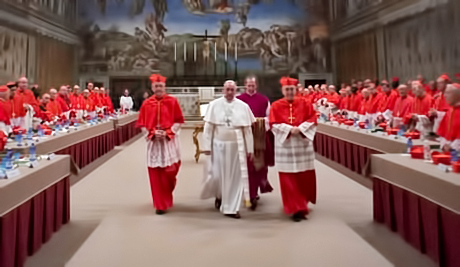The election of Cardinal Jorge Mario Borgiglio was a surprising outcome, and even if Bergoglio suspected something was up, few others did, including many of the cardinals in the Sistine Chapel with him.
“I think it all came together in an extraordinary fashion,” Chicago Cardinal Francis George told the Chicago Tribune.
George said Bergoglio’s name had not surfaced as an option in the week of closed-door discussions among the cardinals before the conclave, and Bergoglio had also dropped off the radar of most journalists. He was 76, and many cardinals said they would not vote for someone older than 70. Bergoglio was also reportedly the runner-up to Benedict in the conclave of 2005 and unlikely to return as a candidate.
“I wouldn’t have expected it to happen either this fast or even the way it developed in terms of the choices available to us,” George said. “I believe the Holy Spirit makes clear which way we should go. And we went that way very quickly.”
The Holy Spirit, yes, but other forces also contributed to the unexpected result. And despite the cone of silence that is supposed to remain over all proceedings inside the conclave, leaks in the Italian press and interviews with various cardinal electors have begun to give a clearer picture of how this 28-hour conclave unfolded.
What happened, in short, is that during the first “shake out” ballot Tuesday evening, Bergoglio’s name drew a surprising number of votes, suddenly putting him out there as a potential candidate.
“Cardinal Bergoglio wouldn’t have become pope in the fifth ballot if he had not been a really strong contender for the papacy from the beginning,” Austrian Cardinal Christoph Schoenborn told reporters.
Until then, the field had been considered fairly open, with two main camps each looking for a champion: There were those who wanted a pope who would reform the Roman Curia, the papal bureaucracy — and preferably someone from outside Europe to represent the church’s demographic shift to the Southern Hemisphere. Then there were the electors who wanted to defend the Curia, and they were joined by some who also hoped to keep the papacy in Europe, or even return it to an Italian.
The “reform” camp had no clear champion but a dozen or more possibilities. They reportedly wanted someone from outside Europe, in particular a Latin American, but weren’t sure who.
The Roman camp, on the other hand, had apparently begun to lean toward Brazilian Cardinal Odilo Pedro Scherer, who was born of German immigrant parents and had long experience in the Curia. That made him a plausible Southern Hemisphere candidate, but one with strong European and curial ties.
In the days leading up to the conclave, however, Cardinal Angelo Scola of Milan had increasingly emerged as an apparent front-runner because he was seen as an Italian who could fix the Vatican, a combination some said could attract votes from both camps.
Throughout this wrangling, Bergoglio had maintained a low profile, which was in keeping with his reputation for humility and holiness, and several electors said they found that refreshing. Continue reading
Additional readingNews category: Pope.




